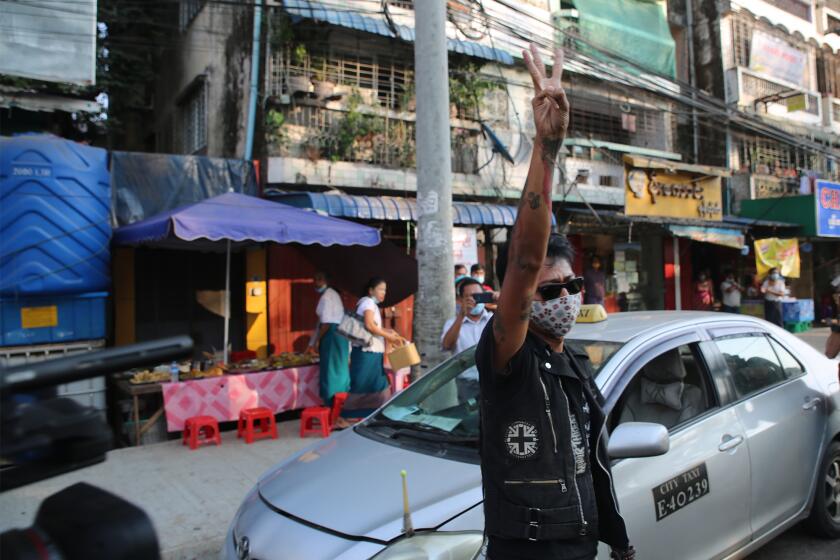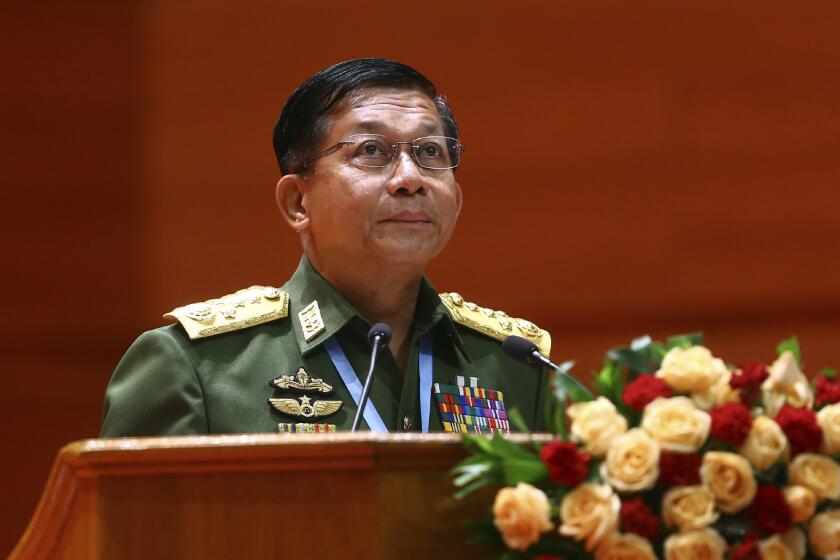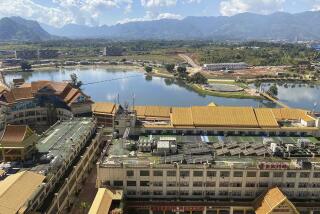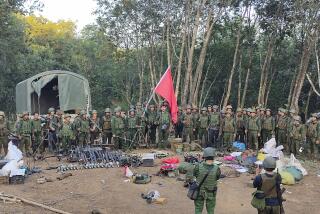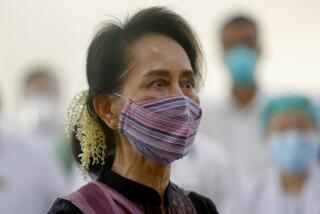Myanmar protesters counter military might with creative civil disobedience
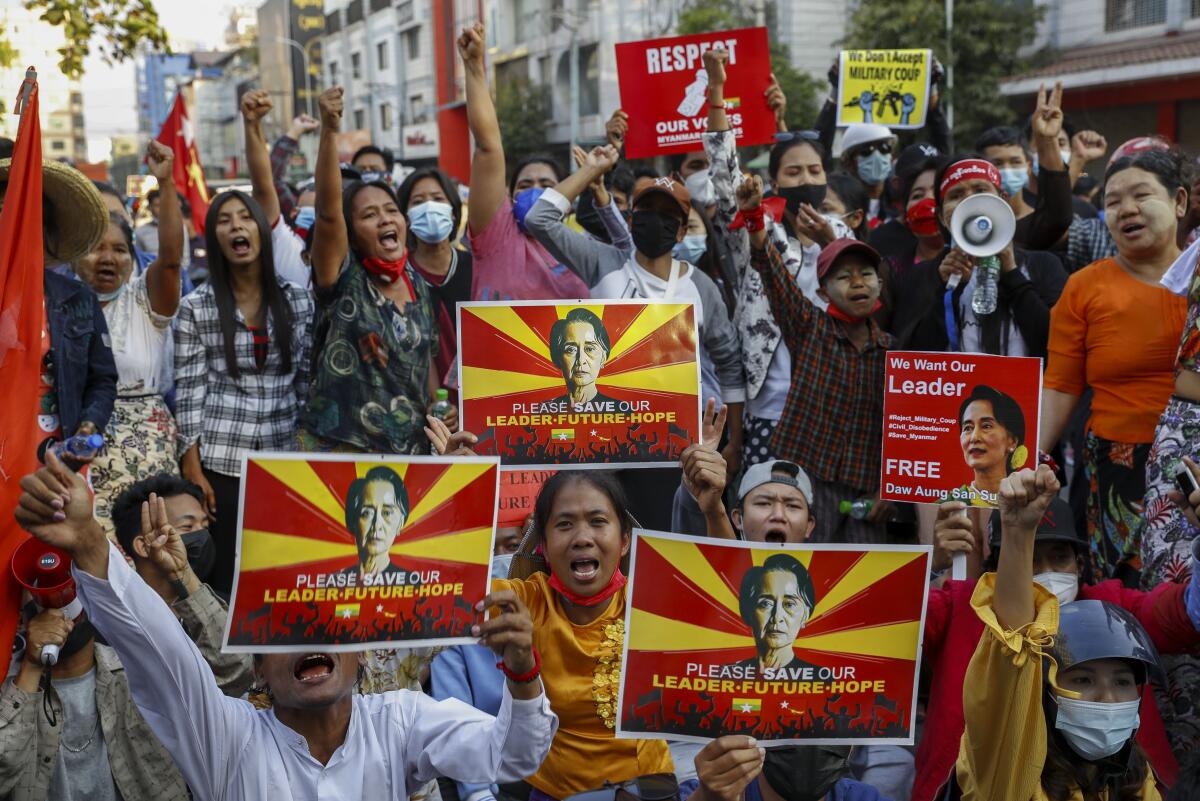
Residents of Yangon, a sprawling city of gilded pagodas, colonial relics and tree-lined avenues, awoke to unusual gridlock Wednesday.
Scores of seemingly disabled cars with raised hoods appeared at major intersections, bridges and thoroughfares, blocking traffic from every direction. When prodded by passersby, owners of the vehicles shrugged and feigned engine trouble or an empty gas tank.
Facing a powerful military that has spent decades inflicting terror on its own people, demonstrators in Myanmar have resorted to creative acts of civil disobedience to protest the army’s Feb. 1 takeover of the country’s civilian government.
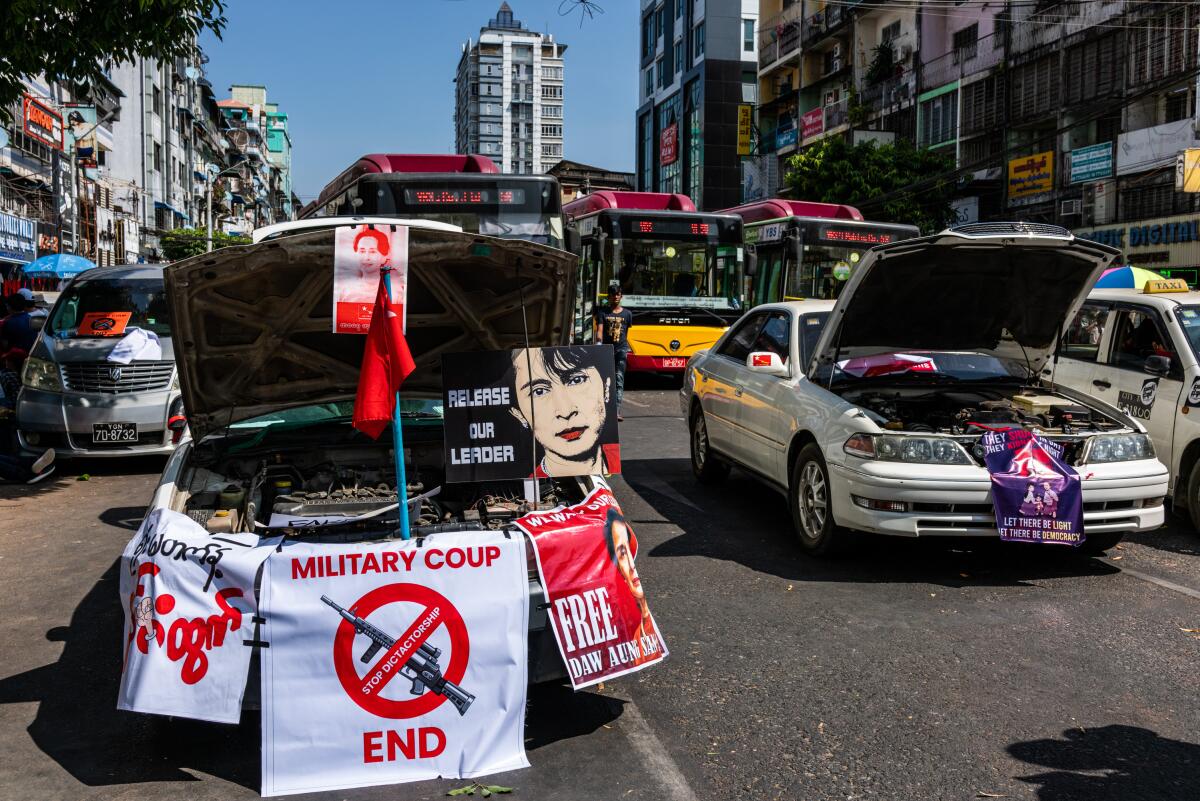
In recent days, defiant citizens have lain down on train tracks to snarl rail traffic, emptied their accounts of cash from a military-owned bank forcing new withdrawal limits and plastered pictures of junta leader Senior Gen. Min Aung Hlaing on sidewalks for pedestrians to trample.
“People are trying everything they can think of,” said Myo Win, a 40-year-old human rights activist. “People are angry. They want to show that they will never accept this illegitimate military coup.”
The staged car breakdowns Wednesday were followed in the afternoon by one of the largest protests yet against the coup. Tens of thousands of demonstrators occupied Yangon’s city center near the landmark golden Sule Pagoda and demanded an end to military rule and the release of Myanmar’s democratically elected leader Aung San Suu Kyi, who, like many of her colleagues, remains under house arrest.
The massive protest raised the stakes again in Myanmar’s explosive political crisis, which is pitting millions of seething supporters of Suu Kyi’s National League for Democracy party against a military that controlled the country for nearly 50 years with impunity before giving way to weak democratic reforms a decade ago.
With that foray into democracy ruined, many people are bracing for a bloody crackdown against the protesters like those ordered by generals in 1988 and 2007.
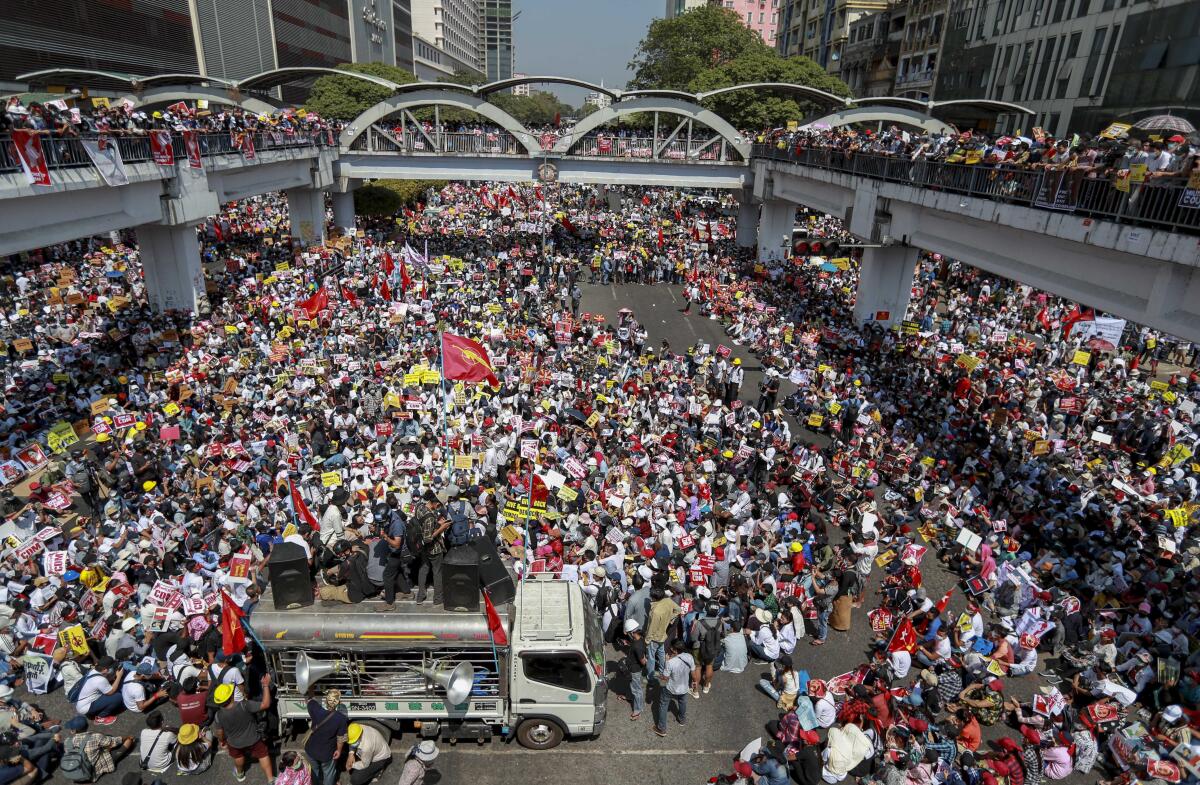
Signs abound indicating the military’s patience is wearing thin. Troops and tanks now regularly patrol city streets in an apparent show of force. Internet access has been blocked nationwide between 1 a.m. and 9 a.m. A draconian cyber bill has been proposed to silence dissent online. And peaceful demonstrators have been targeted with rubber bullets, water cannons, tear gas and even slingshots.
Thomas Andrews, the United Nations special rapporteur on the situation of human rights in Myanmar, warned of potential violence after receiving reports of soldiers from outer regions converging on Yangon.
“In the past, such troop movements preceded killings, disappearances and detentions on a mass scale,” he said in a statement Tuesday.
More than 450 arrests have been made since the coup, according to the Assistance Assn. for Political Prisoners, a human rights group based in neighboring Thailand tracking abuses in Myanmar, also known as Burma.
Many of the arrests took place in early morning raids, sparking panic at night for activists. Many are avoiding their homes, sleeping in undisclosed locations to evade possible arrest.
Thayzar San, a 33-year-old doctor in Mandalay, said he has not been home since Feb. 3, leaving his wife and toddler daughter behind after he helped lead the city’s first anti-coup protest, at which dozens were arrested.
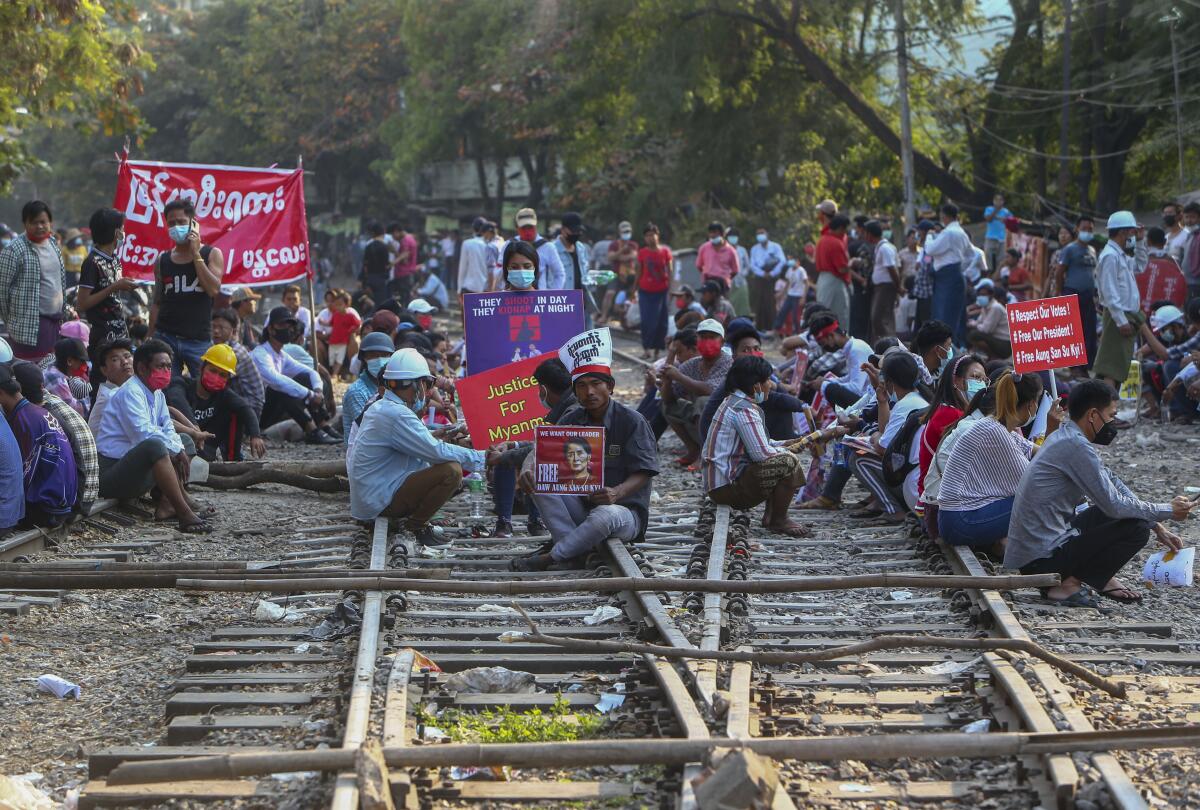
Security forces have also raided neighborhoods looking to take into custody suspected leaders of the civil disobedience movement, prompting residents to respond by clanging pots and pans to alert their neighbors.
Burmese punk band Rebel Riot’s lead singer embodies the growing outrage over the military coup. He’s now rallying others to resist.
Authorities have targeted civil servants, many of whom reside in shared living quarters and have walked out on their jobs.
On Tuesday, thousands of demonstrators were violently dispersed outside a prison in Myaungmya, a city in southwestern Myanmar, after they demanded the release of a primary school principal who was arrested for participating in the civil disobedience campaign. At least 10 people were injured.
It’s against this backdrop of growing fear and intimidation that protesters massed Wednesday, not just in Yangon but also in other cities, including the country’s second-biggest, Mandalay.
Protesters in Yangon, which is also known as Rangoon, included not only activists but monks, students and celebrities too. The crowds played music, chanted pro-democracy slogans and waved banners. One read, “We will never kneel down under … military boots.”
Just a few hundred yards away at the other end of an intersection stood a phalanx of about 100 uniformed police and soldiers, some sitting inside trucks mounted with water cannons.
“We don’t want the government to function. That’s why we shut down the road,” said a 23-year-old protester who gave his name as Nay.
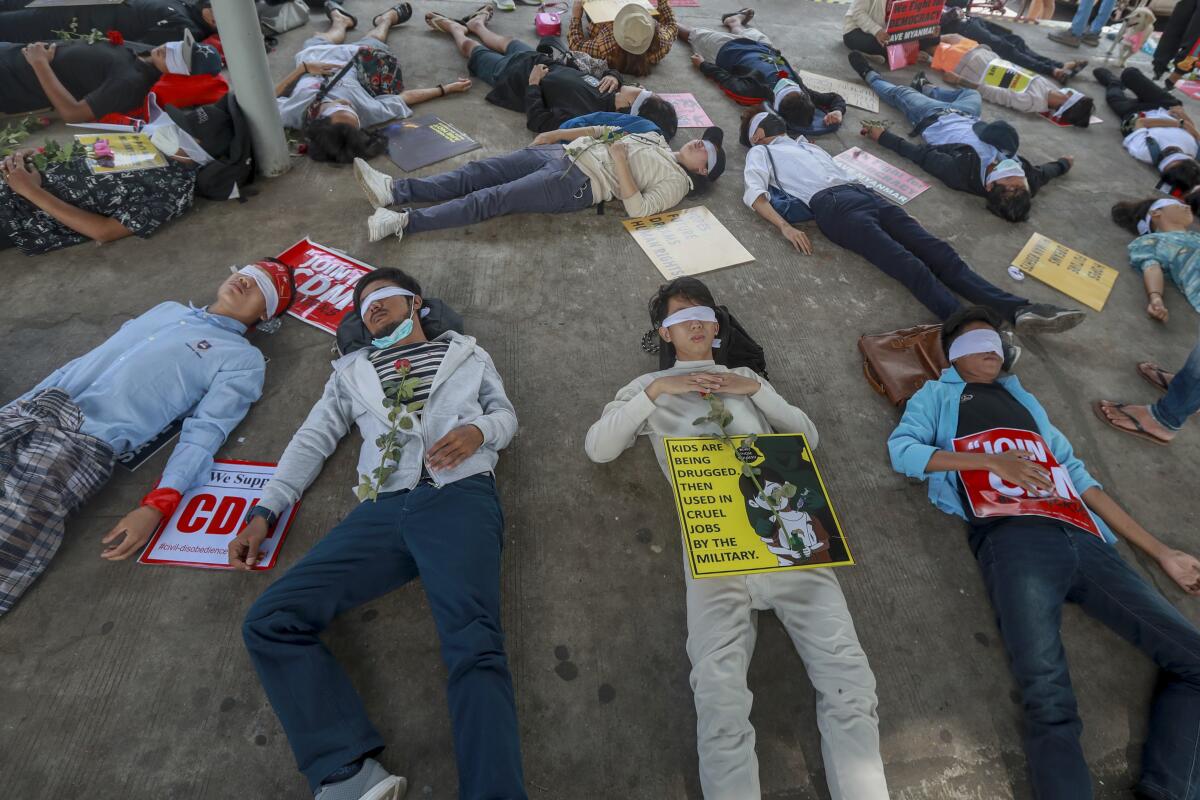
The rallies were in part a response to the military junta’s first news conference Tuesday in which a spokesman defended the putsch as constitutional by repeating groundless claims about irregularities in November’s elections, which handed Suu Kyi’s NLD a landslide victory.
Anger was also simmering over news Tuesday of new charges brought against Suu Kyi, which may allow the junta to hold her indefinitely without trial. She had been charged with possessing walkie-talkies that were illegally imported. The latest charges are for violating a natural disaster law by interacting with a crowd during the COVID-19 pandemic. President Win Myint, who was also detained, has been charged with the same offense.
Junta spokesman Brig. Gen. Zaw Min Tun, said a new election would eventually be held, though he did not say when. The military declared one year of emergency rule after the coup. Few outside the armed forces, known as the Tatmadaw, believe any new election will be free and fair and will instead favor the military’s proxy, the Union Solidarity and Development Party.
Under Myanmar’s constitution, the Tatmadaw is guaranteed 25% of the seats in parliament. However, the Union Solidarity party has never won enough seats for the two to combine as a majority to form a government.
It’s unclear if the military’s electoral failings alone prompted the decision to overthrow the civilian government. Analysts say growing personal animus between the Tatmadaw’s leaders and Suu Kyi, who refused to entertain the idea the election had been tampered with, may have played a bigger role.
Myanmar’s military already held vast economic and political power. Now it has to govern a country grappling with health and economic crises.
International pressure is mounting on the military to show restraint with protesters and release political prisoners. Washington issued new sanctions against several military leaders last week, and calls are growing to end business ties with conglomerates run by the Tatmadaw. The Chinese ambassador to Myanmar, Chen Hai, said in an interview Tuesday that the crisis was “absolutely not what China wants to see.”
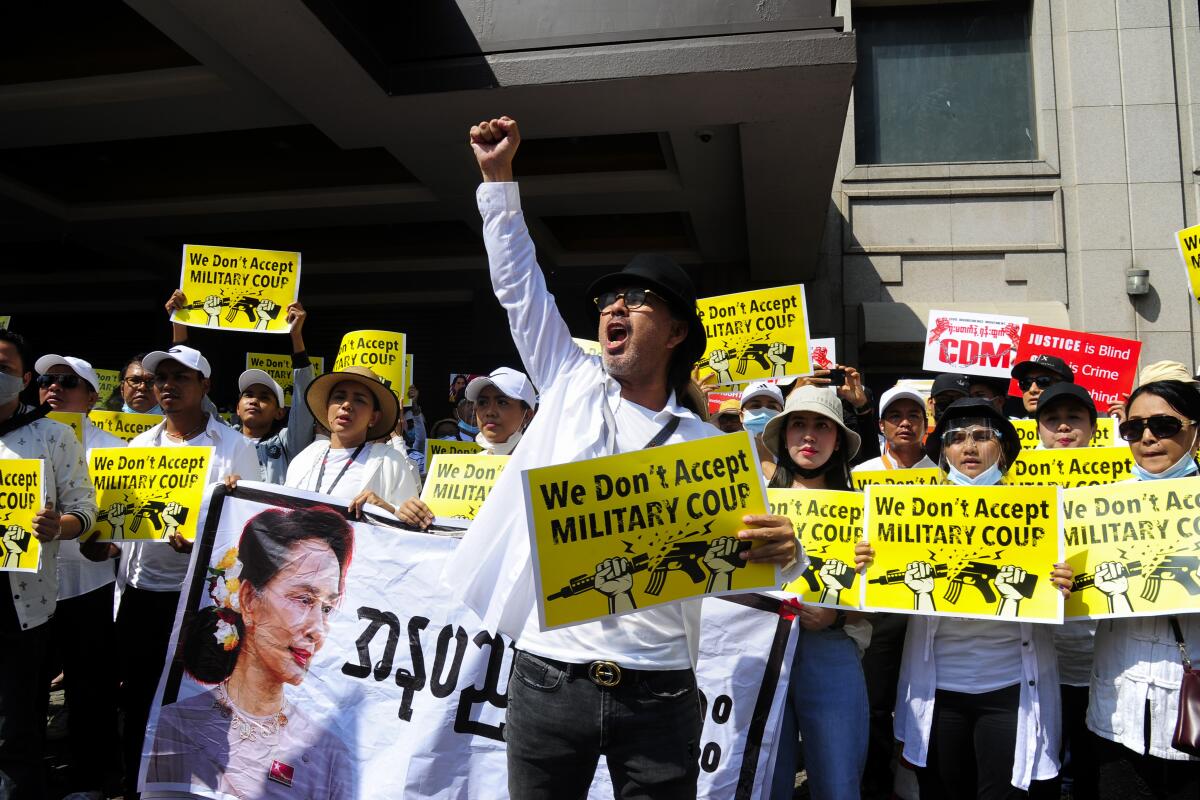
Global support for democracy in Myanmar is complicated by the movement’s standard-bearer, Suu Kyi. The Nobel Peace laureate has been disgraced by human rights groups for defending the military’s ethnic cleansing campaign of the nation’s Muslim minority Rohingya. She is also accused of ignoring Myanmar’s other ethnic groups and doing little to promote wider democratic reforms and nurture civil society.
Yet she remains unshakably popular on the country’s streets, her visage a ubiquitous symbol of resistance.
“Obviously we are very worried about the Tatmadaw, but we are more worried about Daw Aung San Suu Kyi,” a 30-year-old protester who gave his name as Swan said outside Myanmar’s central bank, using a common honorific for older Burmese women.
Some experts say the military’s relative restraint against the protests thus far could be designed to inspire more brazen acts of defiance, providing the generals with a legal pretext to justify a harsh crackdown.
“It’s part of their calculations that staging a coup, perpetrating ethnic cleansing, violent counter-insurgency must include a patina of legal justification, regardless of how absurd those reasons are,” said David Scott Mathieson, a Yangon-based analyst and expert on the Tatmadaw.
This isn’t lost on many protesters, who remind one another on social media to remain peaceful and to not provoke the authorities.
“The protests self-regulate and use social media judiciously to warn, remind and encourage each other, especially not to ‘fall into traps’ that might provide justification for the military to use force,” said Moe Thuzar, co-coordinator of the Myanmar Studies Program at the ISEAS-Yusof Ishak Institute in Singapore.
How the standoff ends is impossible to know. Mediation probably won’t result in a weakened Tatmadaw, which operates much like an organized crime syndicate by killing those who oppose it and cornering lucrative business sectors, including illicit ones such as drugs.
Activists and analysts say holding out for meaningful compromise from an institution as brutal as the Tatmadaw may be foolhardy. The threat of violence grows by the day. Yet nothing — not even collective international pressure — has a better chance of breaking the military’s grip on power more than sustained popular revolt, they say.
“I think they will use both violence and nonviolence to crack down, but it is our duty to protest to protect our democracy,” said Thayzar San, the doctor in Mandalay. “I already expect that will happen, but I am happy to be acting on behalf of our country.”
Times staff writers Pierson and Bengali reported from Singapore and special correspondent Nachemson from Yangon.
More to Read
Start your day right
Sign up for Essential California for news, features and recommendations from the L.A. Times and beyond in your inbox six days a week.
You may occasionally receive promotional content from the Los Angeles Times.
